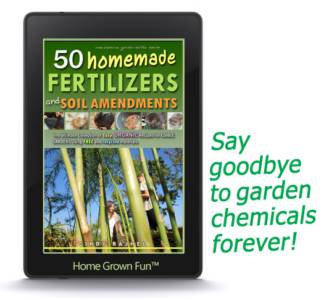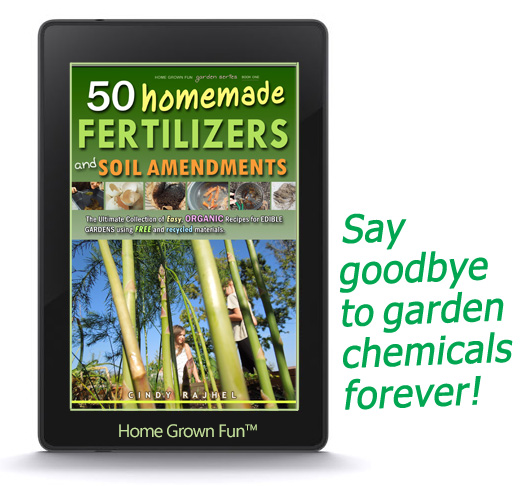“The ultimate collection of EASY, ORGANIC recipes for edible gardens using FREE and recycled materials. There is no other reference out there that covers as many materials and techniques under one cover.”

The homemade fertilizer recipes show you how to recycle weeds, seashells, beer grains and more to improve your soil, save money and grow organic vegetables, herbs and fruit. From our Home Grown Fun™ garden to yours!
This 150+ page eBook profiles many natural materials found inside and outside your home that can benefit your garden. Find out which edibles to use them on, why they might work, and at what stage in the growth cycle they are most effective.
Discover why some fertilizers fail to give you results. You won’t apply the wrong nutrient at the wrong time again! Also get important warnings so you and your plants stay healthy.
Recycle these materials and more into organic fertilizers and soil amendments:
Alfalfa, banana peels, beans, beer (spent grains), borage, borax, comfrey, coffee grounds, compost, cover crops and green manures, crustacean shells, egg shells, Epsom salt, fish, grass, hair, leaves, manure (chicken, cow, goat, horse, rabbit, sheep), milk, nut shells, pet food, pine needles and straw, rainwater, rock dust, seaweed an kelp, urine (warnings too), weeds, wood and plant ashes and worm castings.

For example, to mimic dolomitic lime, combine Epsom salt with eggshells. Dolomitic lime contains 4 percent calcium carbonate and 38 percent magnesium carbonate.
Also use fish trimmings and leftovers from your meals. Any part of the fish works great, including bones and skin. Get a handy Quick Reference Chart showing which homemade applications work best for specific plants! References listed and linked in the back of the book take you to studies that support the information.
Do you know which type of manure works best for pumpkins? For tomatoes? Manures from different animals do not perform the same. They contain different nutrients.
Certain plants will respond better to specific manures. Find out which manure to use depending on what you plant. Do you know how to use manures safely? Get key warnings and procedures to ensure your food does not get contaminated.
Finally, easy to understand explanations to the following questions:
~ How do plants absorb nutrients?
~What is the difference between fertilizers and soil amendments and why is this important?
~WHAT is organic matter, WHY do we need it and WHERE do I get it?
~What are the pros and cons of synthetic and natural fertilizers?
~Are there easy and no cost alternatives to pH Tests?
Bonus Feature:
Step-by-step guide on composting with worms!
NO expensive equipment or confusing instructions. Get worm castings fast using simple tricks of the trade. Before you buy this one eBook, check out the Digital Library for the Bundle to Save $$$. It combines Organic Pest Control Secrets of a Non-Toxic Vegetable Garden, with this eBook, 50 Homemade Fertilizers and Soil Amendments. Read more about the bundle here.
Before you buy this one eBook, check out the Digital Library for the Bundle to Save $$$. It combines Organic Pest Control Secrets of a Non-Toxic Vegetable Garden, with this eBook, 50 Homemade Fertilizers and Soil Amendments. Read more about the bundle here.


